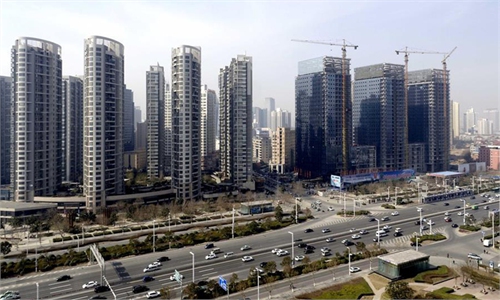Chinese stocks extend rally on policy mix; Shanghai Composite Index crosses 2,900-point mark
Shanghai Composite Index crosses 2,900-point mark

stock market Photo:VCG
Chinese stocks extended their rally on Thursday on the back of newly announced support policies, with the Shanghai Composite Index rising 3.03 percent to climb above the 2,900-point mark.
Analysts expressed confidence in the long-term performance of both the Chinese economy and its stock market, which will continue to defy doomsayers and inject certainty into the world economy this year.
On Thursday, the Shenzhen Component Index was up 2 percent to 8,856 points, and the tech-heavy ChiNext index was 1.45 percent higher at 1,720 points. Net purchases through northbound trading (money invested from Hong Kong into the Chinese mainland) reached 6.29 billion yuan ($888 million), public data showed.
More than 4,800 shares rose, with nearly 100 rising by their daily limit. Shares related to state-owned enterprises led the rally.
The rally came after Chinese authorities in recent days announced a package of policies that boosted market confidence.
Amid the rally on Thursday, a number of foreign investors began to take a bullish view of Chinese assets.
Nicolas Aguzin, CEO of Hong Kong Exchange and Clearing, said at the Asian Financial Forum that international investors remain optimistic about China's growth potential, and he advised investors to diversify their portfolios, stay resilient and wait for the market to rebound.
The Hang Seng Index in Hong Kong closed up 1.96 percent on Thursday, while the Hang Seng Tech Index rose by 0.9 percent.
Bob Prince, co-chief investment officer of Bridgewater Associates, said at the Asian Financial Forum that the company sees attractive prices for Chinese assets and is further deepening its investments in the Chinese market. He also addressed recent policy packages by Chinese regulators to prop up the market. "China still has room for monetary and fiscal policies to help drive the economic recovery," he said.
The rally on Thursday reflected positive policies that reversed market expectations, Yang Delong, chief economist at Shenzhen-based First Seafront Fund Management Co, told the Global Times on Thursday.
On Wednesday, the People's Bank of China, the central bank, announced a reserve requirement ratio (RRR) cut of 50 basis points to unleash 1 trillion yuan of liquidity to bolster the economy.
Various Chinese ministries also made positive statements on issues such as stock market volatility, investor protection and capital market regulation, sending positive signals.
The China Securities Regulatory Commission on Wednesday emphasized the importance of protecting the legitimate rights and interests of small and medium-sized investors.
The State-owned Assets Supervision and Administration Commission of the State Council said on Wednesday that it plans to integrate share market value management into the performance assessments of central enterprise leaders.
The regulators' proactive approach in injecting liquidity into the market is a positive step toward stabilizing the financial system and boosting investor confidence, Dong Shaopeng, a senior research fellow at the Chongyang Institute for Financial Studies at the Renmin University, told the Global Times on Thursday.
These measures are expected to have a favorable impact on the stock market and contribute to overall economic growth, Dong said.
Pan Gongsheng, governor of the People's Bank of China, said at a press conference on Wednesday that China still has plenty of room for monetary policy maneuvers.
"We will strike a balance between the short term and the long term, stabilizing growth and preventing risks, while strengthening countercyclical and cross-cycle policy adjustments to build a sound monetary and financial environment for economic growth," Pan said.
It is evident that China's economy has started to recover. However, there still remains the problem of insufficient demand, which calls for intensified policy measures to boost domestic consumption.
Employing countercyclical adjustments to stabilize market expectations and improve market sentiment is crucial in this regard, Yang said.
More policies are expected to further strengthen the vitality of the economy, experts said.
For the capital market, policies should be rolled out to increase the incentives for investors to achieve higher returns, while simultaneously imposing strict penalties for illegal or non-compliant activities. Only through these measures can the market sustainably recover and make progress, Dong noted.
Yang expected a surge in government bond issuance for infrastructure development, which will create jobs and foster stable investment growth. Additionally, concerted efforts should be made to bolster personal incomes, stabilize the property market and invigorate the stock market, all of which will serve as catalysts for increased consumption, he said.

